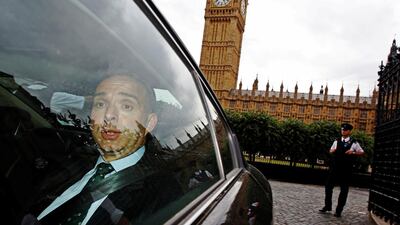The UK’s Plan B to deal with the worst case scenario when Prime Minister Boris Johnson was struck down with coronavirus has been revealed.
Many had speculated that Dominic Raab would become Prime Minister if Mr Johnson was to have died.
Sir Mark Sedwill, the outgoing Cabinet secretary and national security adviser, has now spoken about the plan, confirming that Mr Raab would have taken control of the country, which he said was approved by the Prime Minister before he went into intensive care.
In the event, Mr Raab, who as well as his role as foreign secretary is also the country’s first secretary, took control while Mr Johnson was in intensive care but handed back the reins once Mr Johnson recovered sufficiently.
Sir Mark explained how decisions for handing over power were reached and defended the thinking behind national lockdown orders, while speaking to Off the Record with Alistair Bunkall podcast.
Plan B was implemented about three weeks after Mr Johnson had ordered the country into lockdown on March 23, when he was admitted to London's St Thomas' Hospital for about a week and spent three days in intensive care.
Sir Mark was asked about the day Mr Johnson was taken to hospital: “Without wanting to be too morbid about it, there has to be a Plan B?”
"Yes, continuity of government of course is one of the key principles of anyone's constitution, and so we did make sure we had in place the measures necessary," Sir Mark said.
"Given he was going into intensive care and needed treatment while he was there, that's why we … we talked to him about this in advance so it was on his authority, that Dominic Raab came in as first secretary of state and essentially assumed most of the responsibilities of the prime minister.
"It wasn't just, God forbid, if his condition had deteriorated, but while in intensive care it wasn't possible for him to exercise all of the functions of the premiership, particularly of course if there'd been a crisis.”
Sir Mark, while not implicitly referring to Mr Johnson’s possible death, said decisions around continuity of government relied on well established procedures.
“We have in place, particularly in national security area, well-established procedures for ensuring decisions are taken if the prime minister is indisposed or uncontactable
“I briefed the Cabinet and on the prime minister’s authority Dominic Raab as the first secretary, and he took the chair from there, until the prime minister was sufficiently recovered to do his duties.”
Other ministers and civil servants, including Sir Mark, had coronavirus symptoms during those hectic weeks, and had to work in isolation even as they prepared to order the national lockdown.
Sir Mark spoke about the sombre mood in government as ministers realised national lockdown orders would be needed to fight the virus.
“We had been talking about it for several days but that moment, the fact that the prime minister was giving the address personally, it wasn’t one of those events with experts around him.
“There was the sense that this was a really significant national moment and everyone tried to handle it that way.”
Sir Mark defended the thinking and the decisions that took place but he also said a future public inquiry will decide if they were the right decisions
The UK has about 355,000 cases and 41,675 deaths – the worst country for fatalities in Europe.
“What I can be clear about is that all of those issues were very actively discussed. Were we heading into lockdown fast enough? Were we going too fast?
“Ministers were always having to balance off the potential economic consequences, the compliance among the public and so on.
"These decisions look in hindsight sometimes more obvious than they do at the time. At the time you're dealing with incomplete information, against a virus the full nature of which was still not entirely clear, with all the best advice that you can.
"There were very active decisions in that period … What I can say is everyone thought very hard about it going into that decision."



